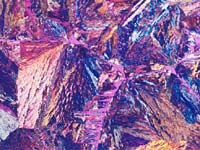|
|||||||||||||||||||||||||||||||||||||||||
| Materials Sc / Chemical Eng - 3137 | |||||||||||||||||||||||||||||||||||||||||
The five-year combined-degree program consisting of a Bachelor of Engineering in Materials Science and Engineering and a Bachelor of Engineering in Chemical Engineering is designed specifically to cater for students wishing to pursue a career in materials/chemical engineering with professional accreditation in both disciplines. The Bachelor of Engineering in Materials Science and Engineering has specialised academic plans in Process Metallurgy, Physical Metallurgy, Ceramic Engineering or Materials Engineering.
The BE BE combined-degree program is based upon the existing single BE programs of Materials Science and Engineering (3135) and Chemical Engineering (3040) and is 240 UOC (5 years fulltime) facilitated by common first and second years, common Honours thesis project in year 5, reduction of 18 UOC in non-core content, and reduction of 6 UOC in the General Education requirement. Students are required to demonstrate a high level of academic ability in their first three years and are expected to perform at a credit level average (WAM >65%) or better to continue progress in both degrees. Student performance is reviewed at the conclusion of Year 2. Students who, at the end of Year 3, do not satisfy this requirement will permitted to complete only one of the BE degrees (this will require internal transfer to the single BE program). The BE BE program structure is specifically designed to facilitate this in that the courses done in Year 2 are acceptable to both single BEs (but need a Program Variation approval) and Year 3 is comprised of Year 3 of one of the single degrees. All students are required to have gained at least 12 weeks of approved industrial experience before graduation and to have submitted satisfactory reports on such work. Industrial experience is usually obtained during a long vacation at the end of years 2/3/4. The Institution of Engineers, Australia recognises the Bachelor of Engineering in both Materials Science and Engineering and Chemical Engineering as meeting the examination requirements for admission to graduate and corporate membership. In addition, the Bachelor of Chemical Engineering is accredited by the Institute of Chemical Engineering. Program Outline Program is 48 UOC per year. Stages 1 and 2 are common to both BE degrees. Stages 3 and 4 as written below are specific to Materials Science and Engineering and Chemical Engineering, respectively. However, Stages 3 and 4 can be done in reverse order depending on students' preferences. Also, courses in Stages 3 and 4 can also be done concurrently subject to course prerequisite requirements and timetabling. The following four academic plans are available in the BE in Materials Science and Engineering: Ceramic Engineering, Physical Metallurgy, Process Metallurgy, and Materials Engineering. These academic plans are defined by the MATS professional electives in the particular area of specialisation. Program Objectives and Learning Outcomes Please refer to the section above or contact the School of Materials Science & Engineering for information regarding the Program Objectives and Learning Outcomes.
Stage 1
Plus
Year 1 elective 6 (UoC), recommended:
Note: Students can take the combination CHEM1011 and CHEM1021 or the combination CHEM1031 and CHEM1041 as a replacement for the combination MATS1101 and CIEC1001
Stage 2
Stage 3
Stage 4
Stage 5
For Professional Electives for Stage 3, 4 & 5 please click on the links below:
Process Metallurgy Plan
The Process Metallurgy plan is designed to produce graduates with training appropriate to the primary metallurgy industry. The profession is very broad and affords opportunities for involvement in many specialist activities in production, technical control or development, in metal or mineral producing industries. Physical Metallurgy Plan The Physical Metallurgy plan is designed to produce graduates with training appropriate to both the metal and product manufacturing industries. The profession is very broad and includes careers in metal manufacturing companies, product manufacturing companies (eg, whitegoods, automotive, aircraft) utilities, airline overhaul and maintenance operations, consulting companies, and research organisations. Graduates may be employed in production, technical control and development, quality assurance, technical marketing and management. Physical Metallurgy is introduced comprehensively in Stages 3 and 4 by a number of professional electives. Students also undertake a materials design project and a substantial thesis project. Students may complete the first one or two years of their degree at their local university engineering school and then transfer with advanced standing to UNSW. Ceramic Engineering Plan The University of New South Wales offers the only degree specialisation in Ceramic Engineering in Australia. The Ceramic Engineering plan is designed to produce graduates with expertise appropriate to the ceramic manufacturing industries which engineering ceramics, electrical ceramics, whitewares, glass manufacturing, and refractories. Graduates are employed in a diverse range of areas including production, research and technical development, quality assurance, technical marketing, consulting, and management. The Materials Engineering plan provides a versatile, comprehensive coverage of areas involving: the conception and application of properties of materials for use in engineering , structural and specialty needs necessary in the design and development of specific components; supervision of manufacturing; evaluation and certification of specifications and characteristics; productio Please refer to Program Structure and contact the School of Materials Science & Engineering for the Academic Requirements relating to this program.
For information regarding fees for UNSW programs, please refer to the following website: https://my.unsw.edu.au/student/fees/FeesMainPage.html
|
|||||||||||||||||||||||||||||||||||||||||



